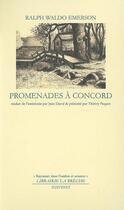-
Nombre de pages : (-)
-
Collection :
(-)
-
Genre :
(-)
-
Thème :
Non attribué
-
Prix littéraire(s) :
(-)
Résumé:
Standing on the bare ground--my head bathed by the blithe air and uplifted into infinite space--all mean egotism vanishes,' Emerson wrote in Nature, his statement of the principles of transcendentalism. 'I become a transparent eyeball.' Nature, published in 1836 when Emerson was thirty-three, is... Voir plus
Standing on the bare ground--my head bathed by the blithe air and uplifted into infinite space--all mean egotism vanishes,' Emerson wrote in Nature, his statement of the principles of transcendentalism. 'I become a transparent eyeball.' Nature, published in 1836 when Emerson was thirty-three, is collected here with his book of observations on the English people; a famous sermon against administering communion in church; a sketch of his step-grandfather; the eulogy he delivered at the funeral of his Concord friend and neighbor Henry David Thoreau; twenty-three poems; and addresses, lectures, and essays on such subjects as slavery, self-reliance, and organized Christianity's obsession with the person of Jesus. Emerson called transcendentalism another word for idealism--'hypothesis to account for nature by other principles than those of carpentry and chemistry.' Considered intensely radical at a time when materialism and a rigid form of Christianity were ascendant, he urged Americans to 'enjoy an original relation to the universe.' These selections span Emerson's career as author and traveling lecturer, and chart his evolving thought: the concepts of the 'over-soul,' individualism without egotism, and antimaterialism; a belief in intuition, independence, and 'the splendid labyrinth of one's own perceptions.
Donner votre avis















